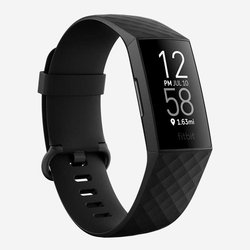
Fitbit Charge 4
Fitbit
Bluetooth
If you want to hit your personal best and kick life’s butt, you’ve already wasted too much time reading this sentence. Your metabolic rate has dropped 2% lower than a sprinting cheetah. Just kidding. This GPS tracking, heart rate monitoring, sleep tracking, stairs climbed, calories burned, swim proof fitness tracker pairs with you phone and computer to tell you if you are, indeed, kicking life’s butt.
What could happen if something goes wrong?
Fitbit seems to do a good job with privacy and security. It de-identifies the data it collects so it's (hopefully) not personally identifiable. We say hopefully because, depending on the kind of data, it’s been found to be pretty easy to de-anonymize these data sets and track down an individual’s patterns, especially with location data. So, just be aware with Fitbit--or any fitness tracker--you are strapping on a device that tracks your location, heart rate, sleep patterns, and more. That's a lot of personal information gathered in one place. One more consideration. Google is in the process of buying Fitbit. What does that mean? We don't know quite yet, but it does seem that all that sensitive data Fitbit collects may soon be owned by Google, a company that likes to have as much data on people as possible.
Can it snoop on me?

Camera
Device: No
App: Yes
Microphone
Device: No
App: Yes
Tracks location
Device: Yes
App: Yes
What can be used to sign up?
Yes
Phone
No
Third-party account
No
What data does the company collect?
Personal
Name, date of birth, gender, height, weight, photo (optional)
Body related
Heart rate, movement, sleep data, menstrual cycle, and more
Social
Fitbit connections
How does the company use this data?
How can you control your data?
What is the company’s known track record of protecting users’ data?
No known incidents in the last 2 years.
Can this product be used offline?
User-friendly privacy information?
Links to privacy information
Does this product meet our Minimum Security Standards?

Encryption
Fitbit protects data sent between your device and the Fitbit app with strong encryption.
Strong password
Fitbit devices work by being paired to a Fitbit account via the Fitbit mobile application. To create a Fitbit account, users are required to provide strong, complex, passwords during onboarding.
Security updates
Updates are pushed automatically when you pair your device with the app.
Manages vulnerabilities
Fitbit has a bug bounty program, which means that anyone who finds a security issue and discloses it responsibly may get paid.
Privacy policy
Fitbit's privacy information is written in fairly simple language. Google is also working on acquiring Fitbit, with the deal pending the decision of EU antitrust regulators at the end of 2020.

Dive Deeper
-
How to Lock Down Your Health and Fitness DataDavid Nield
-
We read your wearable tech's privacy policy so you don't have toWareable






Comments
Got a comment? Let us hear it.